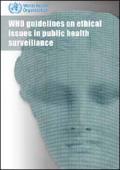Guidelines - Released in 2017
Surveillance, when conducted ethically, is the foundation for programs to promote human well-being at the population level. It can contribute to reducing inequalities: pockets of suffering that are unfair, unjust and preventable cannot be addressed if they are not first made visible. But surveillance is not without risks for participants and sometimes poses ethical dilemmas. Issues about privacy, autonomy, equity, and the common good need to be considered and balanced, and knowing how to do so can be challenging in practice.
The WHO Guidelines on Ethical Issues in Public Health Surveillance is the first international framework of its kind, it fills an important gap. The goal of the guideline development project was to to help policymakers and practitioners navigate the ethical issues presented by public health surveillance. This document outlines 17 ethical guidelines that can assist everyone involved in public health surveillance, including officials in government agencies, health workers, NGOs and the private sector.
Downloads
Organizations
- World Health Organization (WHO)






